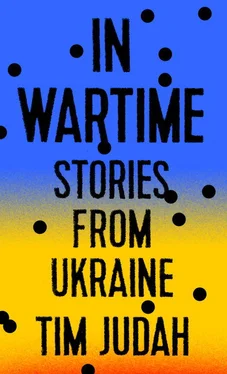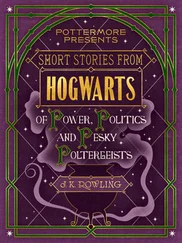A smart woman strolled by with her glossy black Labrador, trailed by four friendly strays who had joined them for their walk. Natalya Sokolik was a forty-one-year-old doctor. She talked about three waves of fighting, the last one ending with the February ceasefire. She reckoned that out of 200 local doctors, only twenty-five were left. In her block, which had been home to up to 250 people, she thought there might be thirty or forty now, though some had trickled back recently. After the first ceasefire in September, some returned “even with kids,” but this time no one had risked coming back with children in case they had to leave all over again. Yesterday, she said cheerfully, “I got my first pay for eight months!” It was about $120. Today there were virtually no jobs here, and while there was food in the few shops that were open, basics were expensive and cash hard to get hold of.
Money was a serious issue. The rebel-held east had been excised from Ukraine’s financial and banking system. ATMs were just dead black screens, banks were closed and those who did work and who managed to get paid now received their pay in cash. A large proportion of those who had stayed in the rebel-held east were pensioners, but every week it was becoming harder and harder for them to collect their pensions. Officially you had to travel to government-controlled regions and register as a refugee there. That was beyond the means of many. It was taking up to two months even to get the Ukrainian permission necessary to travel to government territory and back. That was one reason why the other side of the front line was increasingly being referred to as “Ukraine,” as though it had already become the foreign country that rebel leaders said they wanted it to be.
About the future, Nataliya was circumspect, choosing her words carefully. No one knows what it will hold, and she could see I was being escorted by a man in uniform, who had been detailed to show me around by the mayor. “Let’s see…” she said, “but according to the opinion of people here, they would not like to be part of Ukraine again after everything they have experienced.” At a small corner shop, close by a flat that had taken a direct hit, we met Larisa Kovalova, aged sixty-five, a retired physics teacher. She reminisced about good times in the past when she could afford to go on vacation in Crimea and the Caucasus. Now, she said, hardly anyone remained where she lived, except for some other old people. Most of the others had gone to Russia, but they had left dogs, cats and chickens and someone had to look after them.
Soon we came across a group of old ladies chatting in the sun. They showed me the cellar under their block where they had been sheltering when there was shelling. They had been given some onions as part of a package of humanitarian aid and had planted some in the courtyard. Their spring bulbs were peeking into life. The women pointed out where two of their number had been killed as they ran for the shelter. A few minutes’ drive away was a nuclear bunker from the 1960s, complete with pictures of mushroom clouds and instructions, beautifully preserved in historical aspic, about what to do in case of a nuclear attack. About forty-two people were sleeping here, but when things were bad, up to 200 crammed in. Now some did not want to leave because they were still scared, and some were staying because their homes had been badly damaged.
Alona Petrova, aged sixteen, sat on her bed with her boyfriend Rovshan Gladkikh, aged twenty. They met in the bunker and theirs was a wartime romance. They wanted to get married. Alona said that after the war she wanted to study, and Rovshan said he wanted to become a miner like his father. This is mining country, and a few miles away is the town of Stakhanov, named after the champion miner of Soviet legend who worked here. Rovshan said his shell-shocked mother, who had survived a shelling incident, was too scared to go home. His eleven-year-old sister Sabrina watched TV. “We want independence,” he said, when I asked him about the future. “How can we live with them if they are killing people?”
Even when peace returns to Pervomaysk, a thick seam of bitterness has been laid down now. It was a dilapidated, rust-belt sort of place before the war and it is hard, if not impossible, to imagine it ever flourishing again. As in the former Yugoslavia, buildings can be rebuilt, as they were in the devastated eastern Croatian town of Vukovar, for example, but if there is no work and no reason to return, then places like this will shrivel and die. The same goes for Popasnaya on the Ukrainian side.
When Gnome drove us there in his armored car, he insisted we put on our flak jackets for the last stretch of the road. (Gnome is his nom de guerre, and he asked that his real name not be used.) Then he stepped hard on the accelerator and we hurtled down the last few kilometers of straight and exposed road. He kept glancing to his right, over the fields. A few days before, he said, one of his tires had been shot out by a sniper from the rebel side.
Gnome was a paramedic and member of Hospitallers, a volunteer group, who draw their name and inspiration from the Knights Hospitaller order founded in 1099 at the time of the Crusades. They were doctors and medics who had established a system for frontline medical evacuations to slash the number of Ukrainian soldiers dying, not because their injuries could not be treated, but because they could not be transported to proper medical care quick enough.
In Popasnaya, which the rebels held and then lost in July 2014, things were as quiet as in Pervomaysk. In its hospital I met Dr. Alexander Kovalchuk, who used to work there. Now he is the head of the surgical unit in Popasnaya. In 2011 it was estimated that there were 22,000 people here, but now he said there might be just 5,000. About 70 percent of the hospital medical staff had either remained or returned. Unlike in Pervomaysk, staff were being paid and the banking system was working here.
Many of those who remained in Pervomaysk voted for Russki Mir or “Russian World,” said Kovalchuk, using an expression favored by Russian nationalists, and referring to the rebel anti-Ukrainian referendums of May 2014. Now they had “tasted it,” he said, many regretted it. Because the mobile phone system still worked he talked to friends and family there and they were “really fed up.” But here in Popasnaya, he conceded, there were people, especially “simple people,” as opposed to the middle class, who supported the rebels, though there were also pro-Ukrainians remaining in Pervomaysk. The war would “last long,” he thought, but for now “we are not talking about taking back those territories, though we would like to reunite with our friends and relatives.”
In a ward I met Alexander, aged fifty-two. He had stomach ulcers. He said he had not left Popasnaya because he had to look after his parents, who were too old to go. His apartment had been damaged and he could not live in it. “I don’t know who shelled it,” he said, “but it obviously came from Pervomaysk. We are fed up with everyone and everything. We want a united Ukraine, but the rebels and the Ukrainians need to talk.” A man in the next bed, who did not want to give his name, said, “Ukraine wants peace,” but added that he thought its leaders did not.
The center of Popasnaya had been damaged, though not as extensively as Pervomaysk. Bundles of clothes lay on the rubble of a block whose top-corner apartment had been eviscerated by a missile. A man died during the attack. Oleg, aged fifty, said he was collecting what remained from the apartment for his ex-wife and son, who had moved to Kharkiv. “She phoned me and asked me to get everything that is left.” He was stuffing it all in his car. In a grocery shop Oxana, aged forty-one, said that her son, who was twenty-one, had gone to Russia. “Thank goodness he did not join the rebels.” Half of her friends had gone to Russia, and the sympathies of those that remained were divided. “I supported this country from the beginning,” she said, but many did not. “To be honest,” the town was “divided.” Many who had supported the rebels had changed their minds, none the least because “it is very bad there in Pervomaysk.”
Читать дальше












